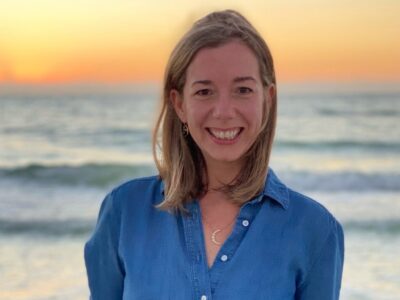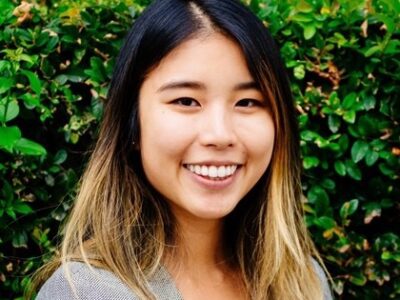
Elaine Angeles grew up in the Philippines’ Olongapo City—an area prone to disasters. It gave her a deep sense of responsibility and an understanding of the importance of taking care of forests and oceans, igniting her passion for environmental science and policy.
With extensive experience in humanitarian work, Angeles is passionate about developing better tools for anticipatory humanitarian action. She believes that when you live close to nature, it is impossible not to see how dependent you are on it, and is aware of how easily disasters can happen when you take it for granted. Now, with a Master of Public Administration in Environmental Science and Policy (MPA-ESP), offered jointly by the Columbia Climate School and SIPA, Angeles is dedicated to driving change by better utilizing scientific forecasts and early warning systems to support vulnerable populations and reduce the impacts of natural disasters.
What drives your interest in environmental policy?
To me, it’s not just a topic of interest—it’s personal. The Philippines gets hit by several typhoons year ’round. I remember many times when my family would need to frantically move our belongings to the upper floor as the water rose quickly.
In 1991, when I was seven, Mount Pinatubo, located a few towns away from my hometown, erupted. The impact was made so much worse because it coincided with a typhoon. Lahar [a stream of volcanic debris and mud] raged and buried entire towns. Winds and rain brought massive amounts of ash to our town, and we had to evacuate. I remember seeing the extent of damage and suffering, and how people’s urgent needs are simply not met. To prevent this, the whole system must work, and policymakers have an important role to play. I was tired of waiting for the system to be fixed. I wanted to be part of the solution.
What is your educational background and work experience?
I completed my bachelor’s degree in political science at the University of the Philippines, Manila, in 2005. After graduation, I worked for an NGO and later a private mining company focusing on corporate-community sustainability. In 2014, I joined the UN World Food Programme (WFP) Philippines as a senior programme associate, as I wanted to shift my focus to disaster preparedness and response.
I studied MPA Environmental Science and Policy from 2018-2019 at SIPA. I then worked for the International Federation of Red Cross and Red Crescent Societies (IFRC) in New York as a humanitarian affairs adviser and later as a climate change coordinator, reporting to the Geneva headquarters. For the past two years, I have been an environmental affairs officer at the United Nations, leading environmental management in peacekeeping operations and supporting sustainability across the UN system.
What made you choose Columbia’s MPA-ESP program?
I wanted a program that would provide me with the tools I need to become a better humanitarian and development professional. I had practical experience but wanted to be able to combine that with a deeper understanding of environmental science and policy, and to leverage my own experience to call for change in the international space. The ESP program stood out because of its emphasis on science and policy. The way it was designed as a one-year, three-term program was perfect for me as I wanted to get back to work right away. The spaces it provided for collaboration through workshops and training on key messaging and translating complex information for decision-makers were my top highlights.
Can you describe a project where you used skills you learned from the ESP program?
Right after graduation, I joined the IFRC. I was lucky enough to be part of discussions around anticipatory action, building on my previous work at the WFP. It was amazing to see incredible progress on this, and at the same time realize that I have grown as a professional, now armed with a nuanced understanding and appreciation of climate science and policy. I did not have a science background before SIPA, so that was a major upskill. Working in the humanitarian diplomacy space required effective communication and negotiation skills and the ESP program proved to be a good training ground for this.
What’s something you wished you had done differently at SIPA?
I was a bit shy while at SIPA. It had been 13 years since the last time I was in a classroom, and living in a different country, especially New York, can be intimidating at first. It took me a while to get comfortable with my new peers. But I wish I had shown myself and talked about my unique experiences more. It would have been useful to engage with more people outside of my cohort and understand what they are doing in their respective fields.
What are your plans for the future?
I would like to set up my own company that will ultimately support local communities in adapting to the impacts of climate change. I also want to do more research on the unique needs of specific communities, e.g., How can their early warning systems be strengthened? How can we make better use of scientific forecasts? How is anticipatory humanitarian action changing the landscape of humanitarian aid? I’m currently working on getting these plans off the ground in the next couple of years.
What advice do you have for current students?
Take advantage of what SIPA offers! Look out for tools and resources you can use and connect with people who can mentor or support you. Be confident. Ask questions. Capitalize on your strengths and experiences, but don’t be afraid to ask for help if needed.



